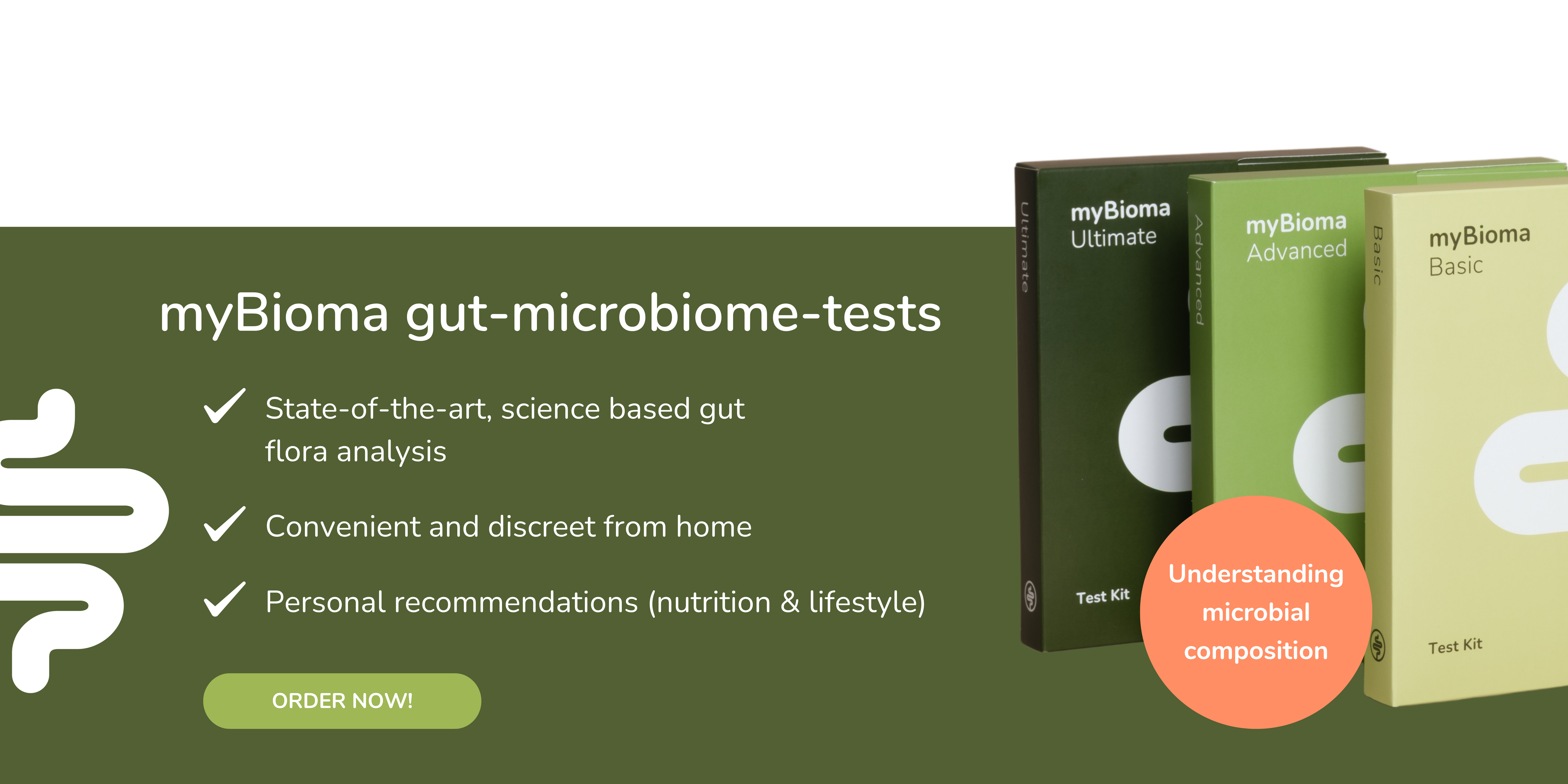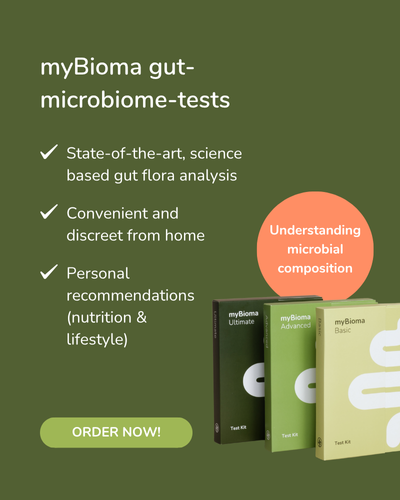Recent studies have shown that high sugar intake increases the abundance of pathogenic bacteria in the gut while decreasing the abundance of supportive bacteria, such as Bacteroidetes. Thus, high sugar consumption can disrupt the entire balance of the microbiome. But especially on days like Halloween, we are prone to consuming vast amounts of sweet foods.
Of course, one day of “sinning” will not greatly affect a healthy microbiome, the important thing is always how we eat on a daily basis – the balance is what matters. However, we want to show you how long-term and increased sugar consumption can be detrimental to your microbiome health.
The typical western diet
The typical Western diet is characterized by the consumption of highly processed foods, a high intake of saturated fat and sugar, and a low intake of vegetables, fruits, and fiber (1). These dietary habits are, demonstrably, associated with an increased risk of metabolic disorders, obesity, and cardiovascular disease. Chronic inflammation is considered to be one of the key components involved in the cause of these disorders (1,2,3).
The consequences of a diet rich in fat and sugar include increased permeability (= permeability) of the intestine, which can cause the penetration of unwanted bacterial toxins into our body. This so-called “metabolic endotoxinemia” does not lead to acute diseases, but to latent inflammations in the tissues. This can result in disturbances in sugar and fat metabolism (3).
Is sugar bad for the intestinal flora?
As for the Western diet, both fat and sugar have been studied in mice in relation to intestinal permeability. High dietary fat in itself can increase intestinal permeability by altering bile acid concentrations, resulting in barrier disruption (4). Recently, researchers investigated the effects of a high glucose or high fructose diet on the gut microbiome and gut permeability, as well as on blood endotoxin levels, inflammation, and fat accumulation in a mouse model (5).
High sugar content in the diet was found to cause changes in the composition of gut bacteria, especially a decrease in bacterial diversity and abundance of Bacteroidetes and an increase in the abundance of harmful Proteobacteria (5). At the same time, the intestinal mucosa showed inflammatory changes and impaired resistance. The animals developed metabolic endotoxemia and fatty liver while remaining normal weight (5).
myBioma shows you whether your bacteria support you in a healthy intestinal mucosa and which good or bad bacilli colonize your intestine. Learn more about your own microbiome here.
How harmful is sugar for the gut?
The observed microbial changes induced by high dietary sugar content, i.e., decreased diversity, increased number of Proteobacteria, and decreased number of Bacteroidetes (5), share common features with dysbiosis associated with metabolic disorders, inflammatory bowel disease, and other diseases (1,3,6).
The increased number of proteobacteria
Excess monosaccharides that are not absorbed in the small intestine may favor organisms that can rapidly utilize simple carbohydrates, such as proteobacteria, at the expense of other bacteria that are specialized in the breakdown of complex carbohydrates and generally have slower growth rates (7). Therefore, high sugar content in the diet may also have deleterious consequences by altering the microbiome in addition to providing excess energy.
Proteobacteria form a small part of the healthy gut microbiome, but when they are increased, nonspecific inflammation can occur (8,9). Bacteroidetes and Firmicutes are the two most abundant bacterial species in a healthy gut microbiome. Bacteroides, for example, have been associated with numerous health benefits, including regulation of inflammatory responses in the gut (10,11).
Sugar damages the intestinal barrier
Thus, high sugar consumption appears to disrupt the balance of the microbiome by altering the ratio of Proteobacteria and Bacteroidetes, leading to increased inflammation and decreased immunoregulatory functions (5). Researchers observed that diets high in glucose or -fructose additionally led to negative changes in the gut microbiome and increased intestinal inflammation and permeability in mice (5). Recent studies have also found that diets high in simple sugars increase small intestinal permeability, or small bowel permeability, in healthy humans (12).
In einer Mausmodellstudie führten Veränderungen des Darm-Mikrobioms, der Darmentzündung und der Permeabilität schließlich zum metabolischer Endotoxämie, erhöhter Fettansammlung und einer Fettleber (5). Interessanterweise traten die Veränderungen ohne Veränderung des Körpergewichts auf und führten zu einer so genannten normalgewichtigen Adipositas (5), die beim Menschen mit einer metabolischen Dysregulation und einem erhöhten Risiko für die Entwicklung eines metabolischen Syndroms und einer kardiometabolischen Dysfunktion verbunden ist (13).
In conclusion, high dietary sugar content may increase the risk of metabolic disorders in normal-weight individuals. Given the close relationship between the microbiome and its very likely involvement in the development of obesity, normal-weight obesity, and associated metabolic complications, considering the microbiome as an adjunct therapy to dietary management may offer an attractive approach to treating these conditions and mitigating the deleterious effects of dietary sugar.
How does the gut react to sugar removal?
By cutting out sugar, your gut microbiome will also change again. Just as quickly as the intestinal flora changes with regular and high sugar consumption, it is also able to regress within a few days. The number of proteobacteria will decrease again and make more room for bacteroidetes, for example.
Staying in balance – how to support your healthy microbiome
Balance is the key to everything! We now know that regular and excessive sugar consumption can harm your microbiome in the long run. Of course, that doesn’t mean you can’t make exceptions. Especially on Fridays like Halloween, it’s just part of the fun to snack.
By the way, did you know that there are healthier alternatives? Dark chocolate, for example, contains flavonoids, which have a metabolism-supporting and antioxidant effect. And it is precisely the flavonoids that your good bacteria are targeting: They convert these relatively large molecules into smaller ones – so they can be absorbed by the body and develop their important antioxidant effect. By the way, on our blog you will find many delicious and gut-friendly recipes to feed the good bacteria. Try it with the: Healthy carrot cake for a happy microbiome .
But of course, here too the motto is: Enjoy in moderation. As long as you stick to a microbiome-friendly diet that consists of plenty of vegetables, fruit and fiber, you are on the safe path.
References
- Zinöcker M.K., Lindseth I.A. The Western diet–microbiome-host interaction and its role in metabolic disease. Nutrients. 2018;1010:365.
- Cordain L., Eaton S.B., Sebastian A., Mann N., Lindeberg S., Watkins B.A., O’Keefe J.H., Brand-Miller J. Origins and evolution of the Western diet: Health implications for the 21st Century. Am. J. Clin. Nutr. 2005;81:341.
- Rastelli M., Knauf C., Cani P.D. Gut Microbes and Health: A focus on the mechanisms linking microbes, obesity, and related disorders. Obesity. 2018;26:792.
- Stenman L.K., Holma R., Eggert A., Korpela R. A novel mechanism for gut barrier dysfunction by dietary fat: Epithelial disruption by hydrophobic bile acids. Am. J. Physiol. Gastrointest. Liver Physiol. 2013;304:227.
- Do M.H., Lee E., Oh M.J., Kim Y., Park H.Y. High-glucose or -fructose diet cause changes of the gut microbiota and metabolic disorders in mice without body weight change. Nutrients. 2018;10:761.
- Lavelle A., Hill C. Gut microbiome in health and disease: Emerging diagnostic opportunities. Gastroenterol. Clin. North. Am. 2019;48:221.
- Zoetendal E.G., Raes J., van den Bogert B., Arumugam M., Booijink C.C.G.M., Troost F.J., Bork P., Wels M., de Vos W.M., Kleerebezem M. The human small intestinal microbiota is driven by rapid uptake and conversion of simple carbohydrates. ISME J. 2012;6:1415.
- Mukhopadhya I., Hansen R., El-Omar E.M., Hold G.L. IBD-what role do proteobacteria play? Nat. Rev. Gastroenterol. Hepatol. 2012;9:219.
- Satokari R. Contentious host-microbiota relationship in inflammatory bowel disease – can foes become friends again? Scand. J. Gastroenterol. 2015;50:3.
- Wexler A.G., Goodman A.L. An insider’s perspective: Bacteroides as a window into the microbiome. Nat. Microbiol. 2017;2:17026.
- Tan H., Zhai Q., Chen W. Investigations of Bacteroides spp. towards next-generation probiotics. Food Res. Int. 2019;116:637.
- Saffouri G.B., Shields-Cutler R.R., Chen J., Yang Y., Lekatz H.R., Hale V.L., Cho J.M., Battaglioli E.J., Bhattarai Y., Thompson K.J., et al. Small intestinal microbial dysbiosis underlies symptoms associated with functional gastrointestinal disorders. Nat. Commun. 2019;10:2012.
- Oliveros E., Somers V.K., Sochor O., Goel K., Lopez-Jimenez F. The Concept of Normal Weight Obesity. Prog. Cardiovasc.







